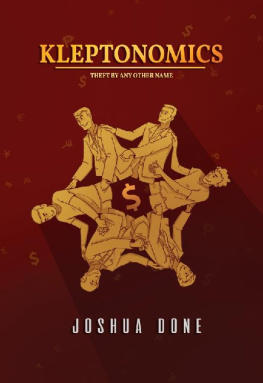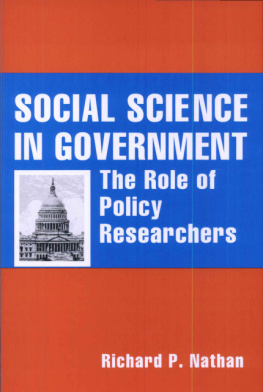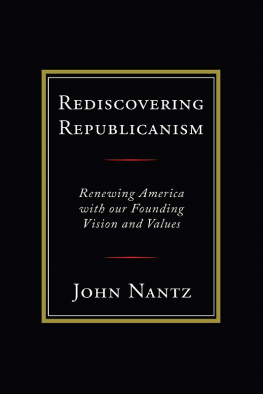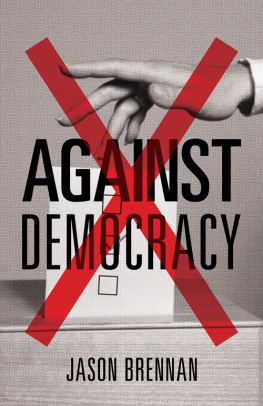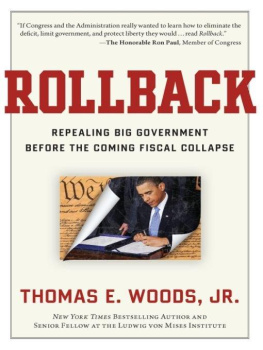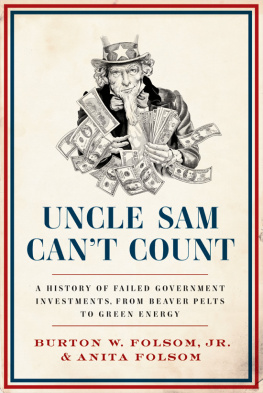KLEPTONOMICS
Theft by Any Other Name
Joshua Done
Kleptonomics | Theft by Any Other Name
Copyright 2021 by Joshua Done. All rights reserved. No part of this book may be used or reproduced in any manner whatsoever without the prior written permission of the author, except in the case of brief quotations embodied in critical articles and reviews.
Edited by Tavio Pela
Contents
INTRODUCTION
Kleptonomics
- The use of seemingly valid economic terminology to justify theft.
- The twisting of economic, political theory, and social terminology to steal the legitimacy of valid concepts to support something different. | Malicious use of semantic overload.
There are two fundamentally similar but functionally different types of kleptonomics. The first is obvious: the use of economics and politics to justify theft. Everyone can rally against this in theory, but in practice we find a lot of people supporting peddlers of kleptonomics. This is because kleptonomics, by its very nature, is deception. Sometimes it is deception of the self, sometimes it is willful deception of others. But every time kleptonomics is used, someone is trying to pull the wool over someones eyes.
From subsidies to taxes, stimulus to international trade, politicians and bureaucrats engage in kleptonomics daily. In many cases they pull it off so smoothly we thank them for stealing from us. Other times, it seems painfully obvious, and we rant and rave about how no one can see the corruption. But here is the kicker: everyone sees it, and most people acknowledge it. So why do they get away with it?
The answer to this can be found in the second usage of Kleptonomics: the theft of conceptual legitimacy. Examples of this include slapping the word democratic in front of socialism and the confusion of rights with entitlements.
These linguistic shifts are designed to obscure the full nature of what is being advocated by packaging kleptonomic goals with other concepts with which we have strong positive or negative associations. Americans tend to approve of democratic systems, and no one wants to explicitly take a stand against something thats your right. Yet both democratic socialism and synthetic rights are concepts used to justify the enslavement and expropriation of individuals.
Another example is the linguistic theft of the word equity to mean enforcing identical outcomes. This switch involves taking advantage of the mental and emotional affinity that most people have towards monetary equity such as home equity to inject false credibility into a new definition of equity that subverts equality.
In Kleptonomics we will examine numerous modern hot topics to unmask specific ways in which kleptonomics is used to exploit others. The basic concepts in this book should be self-evident to US Citizens, like the concept of natural rights, our first topic.
While obvious, many of these concepts are forgotten by many when presented with actual news stories, current events, and ballots. The very nature of Kleptonomics is to be deceptive, so it becomes extremely easy to fall prey to political predators who practice this dark art. Our only defense is to be hyper-aware of what kleptonomics is, what your rights are, and how the first is used to erode the second.
Chapter 1
What are Rights?
Most arguments in politics boil down to arguments about human rights. Advocates of legalized abortion say a woman has a right to choose whether to carry a pregnancy to term, while opponents say that abortions destroy the right to life of the baby in the womb. People upset at the coronavirus lockdowns thought the government was infringing on their right to liberty, while those promoting lockdowns believed that they were necessary for protecting the publics right to health. Defenders of Jack Phillips, the cake artist who refused to create a cake for a gay wedding, said he was expressing his religious freedom, while others argued that he had no right to discriminate.
Of course, there are many other arguments in politics, mainly concerning practical implementations and concerns. Would making abortion illegal lead to more neglected children who turn criminal in the future? How much protection from coronavirus do the governments restrictions really provide? Does this increase in public safety justify restricting peoples right to move freely and conduct business?
When we examine political questions through the lens of rights, we are presented with the fundamental questions of what a moral and just society look like, and for many people thats more important than whether a particular policy will work as intended. For this discussion, we will be focusing on the moral, ethical, and philosophical rather than the purely practical.
We all tend to agree that peoples rights should be protected, but when it comes down to what our rights are, the debate can be endless. The pattern repeats: someone says right X is in danger and calls for government to come in and protect it, and someone else says X isnt a right or the real problem is that the government is now violating right Y in their attempt to provide or protect X. This brings us to the fundamental questions: What are rights? Where do they come from? Why should we care, and how can we protect them?
It is impossible to have a discussion about rights in the United States without bringing up the Declaration of Independence. Our countrys founders wrote, We hold these truths to be self-evident, that all men are created equal, that they are endowed by their Creator with certain unalienable Rights, that among these are Life, Liberty and the pursuit of Happiness.--That to secure these rights, Governments are instituted among Men, deriving their just powers from the consent of the governed.
A couple things jump out immediately. There are basic rights that all people have that are unalienable. Theres no time when you stop having them. A murderer might violate your right to life, and try to kill you, but that doesnt make it right, and even if he takes a life, he cant change the fact his victim had a right to life. Having a right means that there are certain things you have that its never okay for others to take away. This is a negative right, something that cannot be done to you or taken away. A negative right is a preventative right, people and governments are prevented from interfering with it.
A helpful contrast is to compare things we have by right to things we have by permission. At some point, you might have heard a parent say something like TV isnt a right; its a privilege. They might have allowed you access to the TV, but because they provided the TV and cable service, it was theirs to share or take away.
But that was only because your parents not only allowed you to access the TV but provided everything you needed to watch it such as equipment and cable service. If you misbehaved or didnt do your chores, they could revoke the permission to watch TV.
Rights are vastly different from permissions. No one gives them to you. Youre born with certain natural rights that no one, not your parents, not your neighbor, not society or government, gave to you or can take away from you.
The Founders believed that rights existed before government, and that the proper purpose of government was to defend these rights. A moral government is a servant and a protector, not a ruler and an oppressor. Humans dont need permission to live, to be free, and to pursue happiness. We are all born equal.
The founders may have thought it was clear that we are endowed with certain rights by our Creator, and much of their personal writings make these opinions explicitly clear. Their perspective on rights is part of a larger tradition of natural rights filled with both religious and nonreligious thinkers. Natural rights, like many truths, can be arrived at and justified in a variety of ways.
Next page
